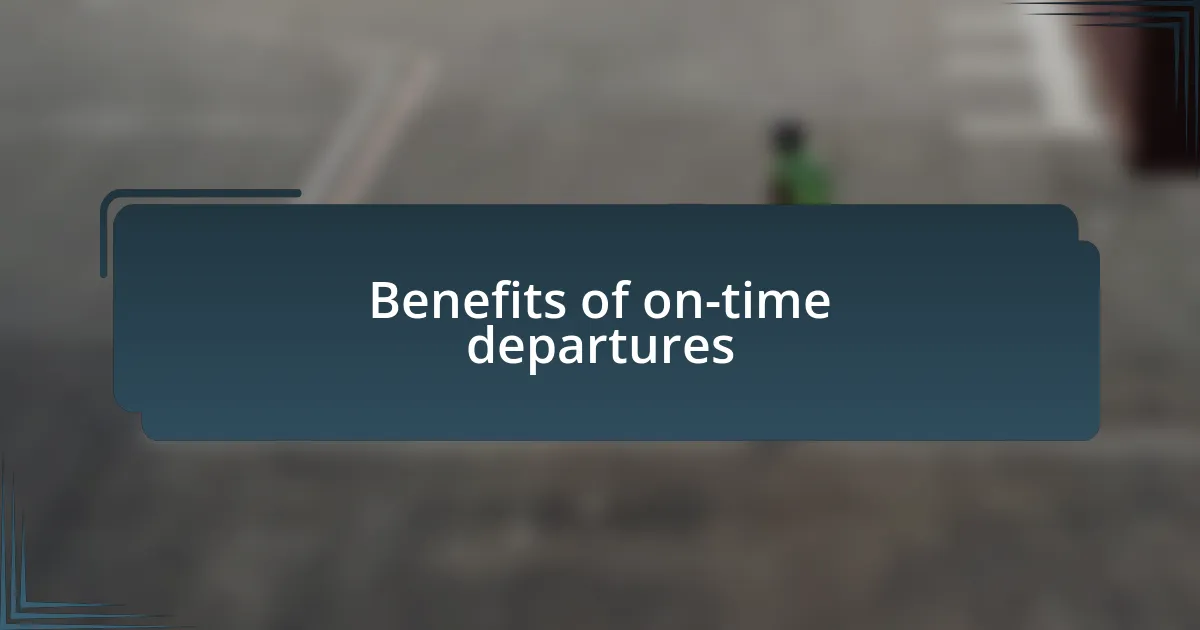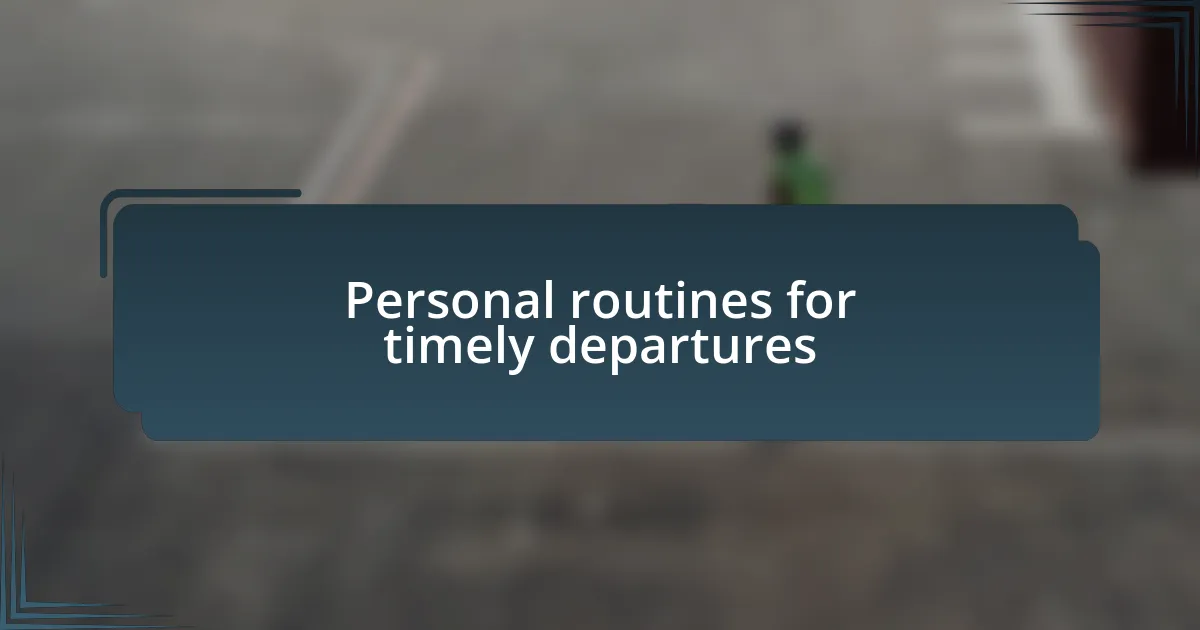Key takeaways:
- On-time departures reduce stress, improve efficiency, and enhance productivity for travelers, particularly business professionals.
- Key factors affecting travel punctuality include weather conditions, airline operations, and passenger readiness.
- Establishing personal routines, such as packing the night before and setting earlier alarms, can significantly improve the travel experience.
- Utilizing digital tools like flight tracking apps and packing lists helps streamline planning and minimize last-minute issues.

Benefits of on-time departures
On-time departures can dramatically reduce stress levels for travelers. When I think back to a time I made a tight connection thanks to my flight leaving on schedule, I remember the relief washing over me. It made me realize how much smoother the entire travel experience can be when we start on the right foot.
Another significant benefit is improved overall efficiency. I once had a trip where every leg of my journey was timely. It felt incredible to maximize my time at my destination instead of waiting at the airport. Isn’t it rewarding to arrive somewhere and get straight to enjoying the travel experience?
Additionally, on-time departures can enhance productivity, especially for business travelers. I recall attending a meeting right after a flight and feeling more focused and engaged because I wasn’t rushed from a delay. If everyone left on time, how much more could we achieve in both our personal and professional lives?

Factors affecting travel punctuality
Travel punctuality can be influenced by several factors, and understanding them can make a significant difference in our experiences. Weather conditions, for example, often play a critical role. I recall a memorable trip when heavy thunderstorms caused my flight to be delayed for hours, which created a domino effect on my plans. This experience highlighted how unpredictable nature can disrupt even the best-laid travel plans.
Factors affecting travel punctuality often include:
- Weather Conditions: Strong winds, rain, fog, or snow can all delay departures.
- Traffic and Transportation: Congestion on the way to the airport can cause travelers to miss their flights.
- Airline Operations: Delays can occur due to airline mismanagement, such as late arrivals of aircraft or crew issues.
- Security Procedures: Longer security lines, particularly during busy travel seasons, can impact departure times.
- Passenger Readiness: Late arrivals at the gate can lead to delayed departures, as airlines often wait for passengers to board.
Understanding these factors can empower me to plan better and anticipate challenges, making my travels smoother overall.

Personal routines for timely departures
Personal routines play a crucial role in ensuring on-time departures. I’ve found that creating a structured pre-travel routine helps minimize last-minute stress. For instance, I’ve established a habit of packing my bags the night before a trip. This simple action not only reduces chaos in the morning but also gives me peace of mind, knowing that I won’t forget essential items.
Moreover, I’ve learned the importance of time management on travel days. Setting an alarm for an earlier than necessary departure helps; this extra time serves as a buffer for unexpected delays, like finding a parking spot at the airport. I remember a day when I underestimated traffic and ended up rushing through security, which was an experience I wouldn’t want to repeat.
Incorporating these routines into my travel plans has transformed my overall airport experience. I’ve become more relaxed and composed, allowing me to enjoy my journeys instead of worrying about the clock. It’s fascinating how these small adjustments can lead to such significant improvements.
| Routine | Description |
|---|---|
| Packing Night Before | Minimizes morning chaos and ensures readiness. |
| Setting Earlier Alarms | Provides extra time for unexpected delays. |
| Morning Checklists | Helps confirm all essentials are packed and ready. |

Tools that aid in planning
Utilizing digital tools can significantly enhance your planning for timely departures. I often rely on flight tracking apps that provide real-time updates on departure times and potential delays. This not only reassures me about my travel plans but also allows me to adjust my schedule on the go. Have you ever experienced the anxiety of running to the gate, only to find that your flight has been delayed? Those moments feel much less stressful when I can access my flight status at my fingertips.
Additionally, I’ve found that calendar applications are invaluable for keeping my travel agenda organized. Setting reminder alerts for crucial tasks—like confirming my reservations or checking in online—ensures I don’t overlook anything important. On one occasion, I was able to save myself from a last-minute headache by simply reviewing my calendar the night before, reminding me to double-check my transportation to the airport. Isn’t it amazing how a few taps on your phone can help keep chaos at bay?
Lastly, using packing apps has also become part of my travel preparation. These apps let me create tailored packing lists based on my destination and trip length. I remember a particularly stressful trip where I forgot my favorite sweater, which would have been perfect for the chilly evenings. With a packing app, I can categorize items to ensure I don’t miss anything, making the planning much smoother and helping to eliminate that familiar feeling of uncertainty before a trip. Wouldn’t it be great if we could all have that level of assurance before heading out?

Strategies to avoid common delays
When it comes to avoiding common delays, an incredibly effective strategy is to plan your arrival time meticulously. I usually aim to get to the airport at least two hours before a domestic flight and three for international ones. It might seem excessive, but I had one experience where a security line was so lengthy that I barely made my flight. Now, I consider early arrival my safety net, ensuring I have time to address any unexpected hiccups.
Another tactic I’ve embraced is checking the weather conditions prior to my travel day. I once ended up sitting in traffic for what felt like an eternity because of unexpected rain, which delayed not just my route but my entire travel timeline. I learned that keeping an eye on weather forecasts helps me avoid those frustrating delays. So, why not look up that forecast before you head out? A little preparation can go a long way.
Finally, I’ve found that being flexible with my travel arrangements can really save the day. There have been instances when I’ve booked alternative transport options in advance, just in case my flight is delayed or even canceled. One time, my flight was pushed back a few hours, and because I had a backup plan—like pre-purchased train tickets—I was able to adapt quickly without losing precious time. Isn’t it empowering to have fallback options at your fingertips?

Adjusting mindset for punctuality
Adjusting your mindset for punctuality is about shifting the way you think about time itself. I’ve often caught myself underestimating how long tasks can take, which is a slippery slope to being late. By actively recognizing that time stretches differently depending on the situation, I started to factor in extra minutes for unexpected delays. Isn’t it interesting how a minor adjustment in perception can lead to significant changes in behavior?
I remember a time when I viewed punctuality as a rigid obligation rather than a personal virtue. It felt daunting and often made me anxious. However, as I began to appreciate punctuality as a form of respect—not just for others, but for myself—I found a new motivation. I felt more in control, like I was truly owning my schedule instead of rushing through it. Don’t you think that when we value our time and the time of others, it transforms how we navigate our daily lives?
One strategy I’ve developed is to create a mental buffer for unexpected surprises. For instance, if I have a meeting scheduled for 10 a.m., I plan my day as if I need to leave by 9:30 a.m., just to be safe. Initially, this felt excessive, but over time, I realized it allows me to breathe, gather my thoughts, and even enjoy a quick coffee on the way. Have you ever felt that sweet relief of having time to spare instead of frantically rushing? It’s a game-changer for both your mindset and your punctuality.

Reviewing and learning from experiences
Reflecting on my experiences has been pivotal in understanding how to improve my punctuality. I often jot down what went well and what didn’t after significant events, like meeting friends or attending important appointments. This process has made me more aware of the patterns behind my tardiness—sometimes it’s as simple as misjudging traffic or underestimating how long I’ll need to get ready.
One particularly enlightening moment was when I missed a train because I failed to anticipate the time it would take to park. I sat there, frustrated, but then I took a moment to analyze what went wrong. This realization taught me that breaking down each part of my journey, from leaving the house to actual travel time, could dramatically change the outcome. Have you ever felt that recognition wash over you when you pinpoint the root cause of a recurring issue?
Now, I’ve adopted the habit of discussing my time management adventures with friends to keep myself accountable. When we share our stories, it becomes clear how common these challenges are—and it’s reassuring. This practice of sharing helps me identify strategies that others have found effective, reinforcing the lesson that there’s always more to learn from each experience. Doesn’t it feel empowering to know that you’re not alone in this journey?











